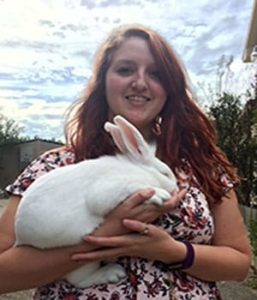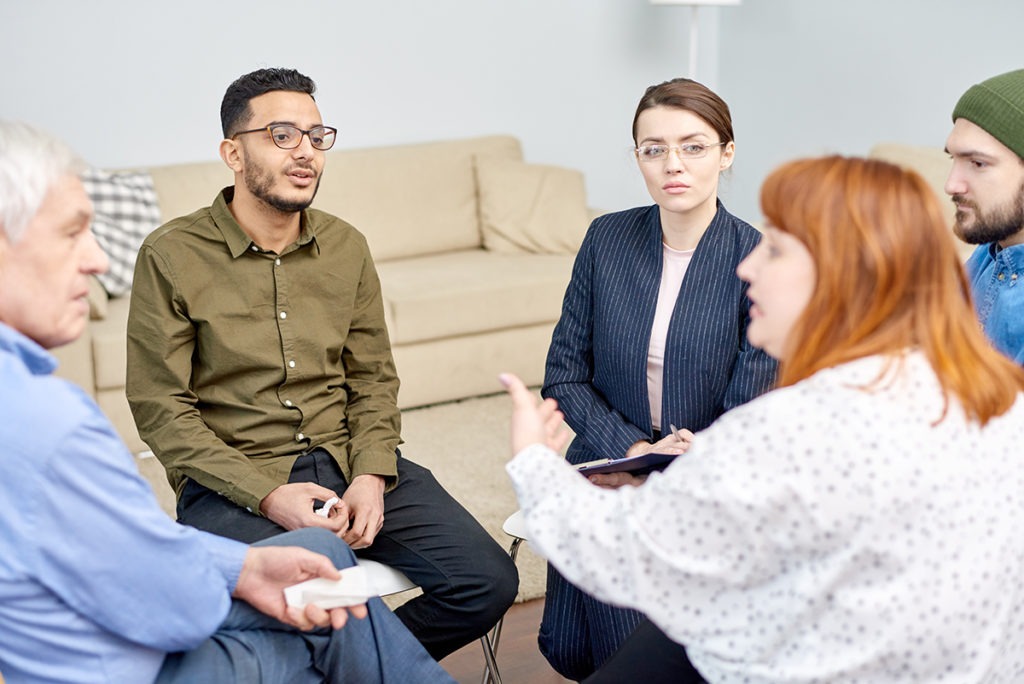By Jennifer (who asked that her last name be withheld) My dog gives me so much comfort and companionship, and accepts me for who I am … when I’m sober. I got Bodie as a puppy and we have had each other for a few years. I see a lot of love in my dog’s eyes, and I know he trusts me. Back when I was drinking or using, this changed. I would see a look of deep concern in Bodie’s eyes that told me I wasn’t being “me” and that he was worried. His expressive eyes told the whole story — that how I behaved when I was in active addiction was unsettling for him. He needed me to be there for him. Even though my family had expressed their concerns for me as well, it was that look in Bodie’s eyes that finally got to me. It made me want to get sober again, and stay sober, for his sake. I’m convinced that my dog saved me from addiction. Thanks to him, I entered an addiction treatment program and got the help I needed.
Animal Therapy Sessions Enriched My Addiction Treatment
After I entered my addiction treatment program at The Right Step, I was happy to hear that one of the program therapists at the facility, Amy Stafford, HCW, held animal therapy sessions with her rabbit. I’d just completed a tough detox and I was really missing Bodie, whom I’d left with my parents for the duration of my 30-day program. The option to join an animal therapy session was a no-brainer for me — I needed some animal love! The first time I met Amy, she was sitting on the floor holding her rabbit in her arms. Amy asked all of us to gather around her on the floor in a circle, quietly and with slow movements, so she could introduce us to Trickster. She advised us to let Trickster come over to us on his own. She said it was best not to pick him up as it might startle him. Once everyone in the group got settled — most of us on the floor with a few people seated on chairs — Amy set Trickster down and he started exploring. He came right over to me and let me stroke his soft coat. I had forgotten how silky rabbits are! Amy asked us to check in with how we were feeling, and tune into anything we needed to process. She asked who had pets at home, what type of pets we had and our pets’ names. She got us talking about our animals as we took turns petting Trickster. I noticed that everyone was smiling, and the people who had started the session sitting on chairs moved down to the floor with the rest of us to get a chance to interact with the rabbit. That made me smile, thinking how animals can so easily disarm us, draw us in and bring us peace.
Animal Therapy Brought New Insights
When it was my turn to share, I told the group what an awesome dog Bodie is, how much I love him, and how petting him and playing with him relieves my anxiety. Amy listened, and then she asked me, “Are you able to love yourself as much as you love Bodie?” That caught me off guard and I had to really think about how to answer that! While I was still processing her question, Amy changed tacks. She said, “Tell me about a time you expressed the same level of care and love you do for your dog, for yourself.” I was dumbstruck. I couldn’t come up with a single example. I realized, in my gut, that I didn’t give myself the same level of care that I gave Bodie. I told her, “It’s almost like Bodie is so pure and good that he deserves better care than I do, and I feel like I let him down when I am not sober.” Amy directed her next question to the entire group. “Ask yourselves if the relationship with your pet is more important, less important or equal to the relationship you need to have with yourself, your sponsor and your recovery.” That got everyone talking about how important it is to have self-compassion, self-love and hope. We talked about letting go of our shame and guilt. As a facilitator, Amy was gentle and non-threatening. She reminded us of the importance of loving ourselves, forgiving ourselves for our past, and remaining disciplined as we worked a recovery program — either a 12-step program or an alternative like Positive Recovery. She told us how vital it is for our recovery to build strong connections within the sober community so we have the support of a sober family and friends. That first session with Amy and her rabbit was an eye-opener for me. I continued attending the animal therapy sessions throughout my treatment, and found that after every session I felt much lighter, calmer and more relaxed. No two sessions were alike, but in each one, Amy used our time with the rabbit to help us talk more freely about what was at the root of our addictions — in my case, anxiety and low self-esteem. Sometimes we discussed anger issues, and Amy would coach people who were feeling angry to pet the rabbit and just breathe until they felt calm enough to discuss things. Other times we discussed leisure activities we had enjoyed as children and what we did for leisure activities as adults. Some people in the group talked about their fears of trying their leisure activities while sober — like they were afraid things wouldn’t be as fun or creative. In those discussions, Amy pointed out how we needed to work through those feelings because leisure activities are important in our overall wellness and recovery.
Animals Can Bring Us Back to Ourselves
 Hanging out with Trickster during addiction treatment and focusing on him while I talked through my issues definitely helped me uncover a lot of truths about myself. And, petting that little rabbit helped me miss Bodie just a little less. Addiction treatment was not easy, but the days that included animal therapy were definitely easier for me, and very insightful. Those experiences brought me greater awareness of how much having an animal’s presence in my life reduces my anxiety, and I’m grateful for that. Now that I’m back home and continuing to work my recovery program, I focus on my dog when I’m craving drugs or alcohol and feeling anxious about relapsing. As I love and care for him, I remind myself that I need to give myself and my sobriety that same level of love and care — and I am making progress. Here is what I have learned about the power of animals and how including them in your recovery can help.
Hanging out with Trickster during addiction treatment and focusing on him while I talked through my issues definitely helped me uncover a lot of truths about myself. And, petting that little rabbit helped me miss Bodie just a little less. Addiction treatment was not easy, but the days that included animal therapy were definitely easier for me, and very insightful. Those experiences brought me greater awareness of how much having an animal’s presence in my life reduces my anxiety, and I’m grateful for that. Now that I’m back home and continuing to work my recovery program, I focus on my dog when I’m craving drugs or alcohol and feeling anxious about relapsing. As I love and care for him, I remind myself that I need to give myself and my sobriety that same level of love and care — and I am making progress. Here is what I have learned about the power of animals and how including them in your recovery can help.
- Animals keep us accountable. Caring for an animal requires your health and sobriety, and is a great way to be in the moment and practice mindfulness.
- Animals offer acceptance. If you are kind to them, they respond to you without judgment.
- Animals takes us outside ourselves. You’re less likely to feel sad or angry when you are focused on grooming a horse or petting a rabbit, kitten or puppy.
- Animals reduce stress. I’d be very surprised if a quiet moment with an animal doesn’t make you smile, at least on the inside.
- Animals, especially dogs, are great icebreakers. I can’t count the number of times that I have been walking my dog and some nice person has stopped to say hello, pet my dog and ask me about him.
I’m not saying everyone in recovery should go out and get a pet, but for me, being with animals and having a pet in my life has made me more conscious of my addictive behaviors and has kept me on the recovery path. I am learning to handle life’s challenges in a sober state of mind, and I thank my dog and many animal therapy sessions for teaching me how important that is — for my dog’s sake and for my own sake.
Sources
Do Animal-Assisted Activities Effectively Treat Depression? A Meta-Analysis. Megan A. Souter, Michelle D. Miller. Anthrozoos, April 2015. https://www.tandfonline.com/doi/abs/10.2752/175303707X207954 How My Dog Saved Me From Myself. Kate Wilson reviews “Dog Medicine,” by Julie Barton. 2015. https://life.barkpost.com/dog-medicine/ Can Therapy Dogs Assist In Addiction Recovery? Santi Meunier. 2008. https://www.santimeunier.com/ART_dog_assist.php My Dog Saved My Life: What It Means to Really Live and Love. Shannon Kaiser. The Blog, March 2014. https://www.huffingtonpost.com/shannon-kaiser/my-dog-saved-my-life-what_b_4603964.html






